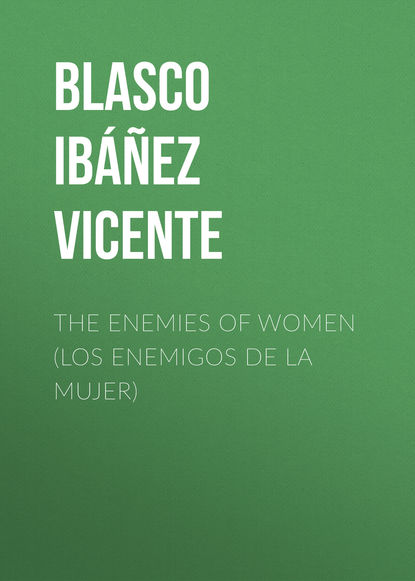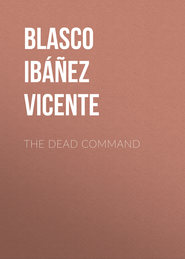По всем вопросам обращайтесь на: info@litportal.ru
(©) 2003-2024.
✖
The Enemies of Women (Los enemigos de la mujer)
Настройки чтения
Размер шрифта
Высота строк
Поля
The great phenomenon was taking place there. Craning his neck above the shoulders of two sightseers, Michael caught a glimpse of Alicia seated at the table with an anxious expression on her face. All eyes were upon her. In front of her, were heaps of bank notes and many columns of chips. There were the five hundred franc ovals, and the one thousand franc squares, "little cakes of soap" as they call the latter, in the language of the Casino.
Suddenly she raised her head as though realizing instinctively the presence of some one interesting to her. And her eyes fell straight on Michael. She greeted him with a happy smile. There was the suggestion of a kiss in her glance. And all the people there, with the submission of a mob when dominated by enthusiasm or amazement, followed her eyes to see who the man was whom the heroine was greeting in this manner. The vanity of the Prince was flattered, as it used to be when some celebrated actress greeted him from the stage and went on singing with her eyes fastened upon him to dedicate to him her trills. Once, when he was a boy, a bull-fighter had bowed to him in a friendly way before giving the final death thrust in the arena. Alicia seemed to be choosing him as her god of luck.
But immediately she fell back into the deep absorption of the play. She was not alone. An invisible and powerful person was standing behind her chair, bending over her to whisper in her ear some word of unfailing counsel, to suggest some unlooked for resolution, some original and daring idea. Her eyes, lighted by a mysterious fire, were gazing on something that no one else could see. Her mute lips trembled with nervous contractions, as though she were talking with some one who did not need sound to be able to hear. Michael felt there was a demon-like power beside her, the inspiration of the unforgettable hours which reveal to artists a masterful harmony, an illuminating word, or a supreme stroke of the brush; the inspiration which prompts the final slaughter in battle or the decisive move in some business venture, that means either millions or suicide.
She had begun to plunge. Her hand carelessly pushed forward a column of twelve rectangular chips, with an extra oval one: twelve thousand five hundred francs, the maximum amount that could be risked in "trente et quarante." The crowd, with the idolatry which victors inspire, was hoping for the Duchess, as though each one expected to share in her winning. They all knew she was going to win. And when as a matter of fact she did win, there was a murmur of satisfaction, a sigh of relief from that oval of sightseers pressing against the backs of the chairs occupied by the players. From time to time she lost, and profound silence expressed their sympathy. Sometimes after advancing a column of chips, she closed her eyes as though listening to some one who remained invisible, and moving her head in sign of assent, withdrew the stakes. Once more there arose a murmur of satisfaction, when the public saw that she had withdrawn her money just in time, and had scored, as it were, a negative triumph.
Many of them computed with greedy eyes the sums amassed in front of her.
"She's in the three hundred thousands already – perhaps she has more – Oh! if she would only succeed in making it millions! What fun it would be to see her break the bank!"
To these comments spoken in low tones were added the laudatory exclamations of a few elderly women who looked at the conqueror with adoring eyes. "How nice she is! – a great lady and so beautiful! – Good luck to her!"
A dark shoulder over which the Prince was looking moved and the Prince saw Spadoni's face close to his. The pianist did not show the slightest surprise; as though they had separated only a few minutes before. He did not even greet Michael. The astonishment which caused the pupils of his eyes to dilate, the indignation and envy that this insolent fortune inspired, made it necessary for the pianist to express his feelings in a protest.
"Have you noticed, Highness – she doesn't know how to play – she goes against all rules, all logic. She doesn't know the first thing about it, not the first thing!"
Immediately his eyes returned to the table, forgetting the Prince on hearing once more a stifled outburst from the crowd. A little more and some of the people would be applauding the repeated triumphs of the Duchess. Those who had lost during the previous days, were rejoicing with the joy of vengeance. "What an evening! You don't see this every day." They smiled and nudged each other as they noticed the coming and going of the inspectors, the presence of high officials who strove to hide their concern, the long faces of attendants as they returned from the head cashier with new packages of one thousand franc chips to pay this lady who had swept the table bare of money three times. The news of her extraordinary run of luck circulated throughout the entire edifice. At that moment the gentlemen of the management must have been discussing in their offices on the top floor the bad trick that chance had dared to play them. A mood of anticipation and excitement, akin to the whispering of a revolution, spread through every nook and cranny. Those who had no tickets for the private rooms asked for news from those who were coming out, repeating what they had heard with exaggeration born of enthusiasm. In the wardrobe, in the lavatories, in the inner corridors, in all the subterranean and winding passageways where the servants, maids and firemen lived under an eternal electric light, this news shook the sleepy calm of the humbler employees. The atmosphere of excitement was similar to that which circulates through the half deserted corridors of the Chamber of Deputies while in the semi-circle teeming with emotion, a Prime Minister is fighting to survive a crisis. The news gathered momentum as it passed from group to group with that satisfaction mingled with uneasiness which is inspired in employees by the reverses of their employers.
"It seems that upstairs a Duchess is winning a million – no: now they say it is two millions."
And by the time the news had circulated throughout the entire building, the two millions had married and given birth to another. Half an hour later they were four millions, according to the lesser servants, who had grown old living off gambling without ever seeing it at first hand.
Michael suddenly felt a great wave of anger against the fortunate woman. Since her smile of greeting she had not looked at him again. Several times her eyes had glanced mechanically in his direction, without taking any notice of him. He was merely one of the many curious spectators witnessing her triumph. At that moment there were only two things in the world, the pack of cards and herself.
Her indifference caused him to feel the indignation of the moralist. It did not make any difference to him that Alicia was forgetting him. He repeated this to himself several times: no, he did not care about that. They were not lovers, nor was there any deep affection between them. But how about her son! He remembered that morning a scene with her tears and despair. And the mother was there abandoning herself completely to the pleasures of chance and with no feeling for anything except her perverted passion.
If some one had spoken to her about the aviator who was a prisoner, she would have had to make an effort to recall his existence. And a few hours before she had wept sincerely on thinking of his imprisonment!
This was too much for the Prince. His sense of dignity could not accept this thoughtlessness! He elbowed his way through a crowd of onlookers, after freeing himself from Spadoni's shoulder, while the latter as though hypnotized, remained with his eyes fixed on the ever-increasing treasure of the Duchess.
Lubimoff began to pace the drawing room. He scorned Alicia's self-absorption, but lacked the strength to go away. It was necessary for him to be near her, perhaps in order to see just how far her slight of him would go.
He came across a gentleman who was walking about among the tables, beating his hands behind his back and muttering unintelligible words. It was his friend Lewis.
"Have you seen how she plays," he said in a tone of anger, as he recognized the Prince; "like a fool, like a regular fool! They ought not to allow women in here."
All afternoon he had been losing according to rule and experience. He did not have enough money left even for his whiskies and had had to charge them at the bar. But suddenly he remembered that the Duchess was a relative of Lubimoff.
"I am sorry if I offended you, but she plays like an idiot."
And he turned his back to continue his furious monologue.
Don Marcos passing in a hurry without seeing the Prince opened a path in the crowd of onlookers with all the authority of a dressy personage. He had just left the gardener's daughter in haste. The news had crept through the theater causing many of the spectators to give up seeing the close of the opera in order to be present at this unheard of run of luck, which was for them a spectacle of the greatest interest.
At one of the roulette tables he saw Clorinda who was playing cautiously, with Castro standing behind her chair.
"The General" had witnessed the first part of her friend's triumph. "She's going to lose: this cannot last," she thought each time. Then she had moved away from the table, explaining her attitude to Castro and other friends. It was impossible for her to watch Alicia tranquilly as she risked such heavy stakes. It was more excitement than she could endure.
"I hope she wins a great deal, a great deal, indeed," she added with the generosity of a friend. "Poor Alicia, she needs it so much! Her affairs are going so badly!"
She had just seated herself at another table with the faint hope that luck would remember her, too; but the murmurings which reached her from the trente et quarante table, announcing the news of fresh victories, made her nervous and she attributed the loss of several twenty franc pieces to this cause. When she found she had lost two hundred, she felt that she must take her spite out on some one. Atilio, who followed her everywhere, was standing there, greeting her expressions of bad humor with an adoring smile.
"Castro, go away; don't stand there behind me. You must know you bring me bad luck. Go somewhere else."
The Prince observed how his friend, with a look of annoyance, left the widow and walked toward the door.
He thought he would follow him. By talking with Atilio, he might forget the irritation which the other woman had caused him; but as he went toward the end of the room he had a new surprise.
In one of the dimly lighted corners he saw Novoa, who was going to spend the afternoon in Monaco or take a walk on the Nice Road. Perhaps the latter was true. He might have been waiting for Valeria who was coming back from her luncheon party. They must have both been there for a long time, in the dark corner, unaware of what was going on about them and deaf to people's comments.
The scientist, with his back turned, was unable to see the Prince. As for the lady, her eyes were fixed on Novoa with the affectionate seriousness of a girl who has taken advanced studies, has the bachelor's degree, and is able to understand a man of science. Michael heard a snatch of the young professor's conversation.
"And when the glacial currents from the pole reach that spot they take the place of the warm waters that rise to the surface…"
He was explaining the formation of the Gulf Stream.
No one could have guessed it from observing the caressing and timidly amorous glances behind his glasses.
She was listening with admiring fervor, but Michael, who knew women, imagined he guessed her real thoughts. She was weighing, with the cunning of a poor girl alone in the world, the possibilities of this man as a husband. He was ignorant of everything not to be learned in books, and she was calculating the modifications necessary to improve the person of this careless male who always wore a necktie badly tied, and never pulled up his trousers before sitting down, to keep them from bagging in a grotesque manner.
Lubimoff spent more than an hour deeply sunk in an armchair in the bar, listening to Castro. The branches of the large trees on the terrace wove soft shadows like spider webs on the window panes in the twilight dusk.
Atilio was giving vent to his melancholy by lamenting the meagerness of the afternoon tea. On account of the war, burnt almonds and potato chips were the only gastronomic delicacies to be offered, in this place frequented by the wealthy.
The crowd roused in him the same sad reflections. There were people there, but very few compared with the numbers that flocked to Monte Carlo some years before. Then they came in limited trains direct from Vienna, Berlin, and the farthest parts of Europe. The square in front of the Casino was a second Babel. Around the "Cheese," people of all races walked up and down, speaking every known language. At present the absence of the Russians, who were spirited gamblers, was to be lamented, and likewise the absence of the Austrians and the Turks. The last persons to be attracted by Monte Carlo were the Germans, but Castro had seen them come in great numbers during the past few years, applying to gambling the same quiet minutely scientific thoroughness of method they used in military discipline, the organization of industries, and laboratory work.
He was always able to recognize them as soon as they entered the rooms. When they sat down at the table they surrounded themselves with books and papers: statistics of the most favored numbers of past years, manuals on how to gamble, their own calculations and logarithms that only they themselves could understand.
"They held on to their money more tenaciously than the rest," Atilio continued. "They were as patient and tireless as stubborn oxen; but they lost in the end like every one else. Who doesn't lose here – even the Casino, that always wins, is losing now. Before the war it brought in an income of forty million francs a year. At the present time it clears not more than three or four millions and since enormous expenses have to be covered, it has had to ask for loans to go on living, the same as a State."
Michael observed those who were passing through the bar. There was only one man for every ten women.
"That's the war, too," said Castro. "You can see women, women everywhere! Before the war, if you recall, even in peace times, the proportion of women was always larger. There are fewer men but they play higher stakes. They risk their money with more daring; three-fourths of the crowd around the tables were composed of women. When women are afraid of love, or disillusioned by it, they give themselves up to gambling with passionate intensity. It is the only means they can find to express their imagination. Besides, when one takes into account their love of luxury, which is never proportionate to their means, and considers the needs of present day women which were unknown to their grandmothers… Look – look over there." He pointed discreetly to a lady advanced in years, modestly dressed and with a face that was daubed with rouge, who was being approached with supplicating looks and gestures by two other young and elegantly dressed ladies. It was easy to guess that they had come in there purely for the sake of discussing some business affair, away from the prying eyes in the gambling rooms.
"They are asking for a loan and she is refusing," Castro continued. "Perhaps it is the second or third time in the afternoon. This lady is a rival of the old man who wears the Sacred Heart on his lapel. He is quite a character, that old usurer! He began as a waiter in a café and must have some two millions now after thirty years of honorable toil. Everything he owns is to be given to the village of La Turbie, which has named him its benefactor. He pays for images of Saints and has rebuilt the church – . Notice: the lady is softening. They are going to get the loan."
The three women had disappeared through the mahogany door leading to the women's lavatories. As the loan agent kept her funds in her petticoats, it was necessary for her to pull up her skirts to carry on her negotiations. Shortly after she came out and walked rapidly in the direction of the gambling room. She had to go on watching several women to whom she had loaned money, to see if they were winning. The two young women followed her with their purses still open, hurriedly counting the bank notes they had just received.
Castro, who had suffered the humiliation of similar operations more than once, began bitterly to attack the vice which maintained this enormous edifice and the whole Principality.
He played to win, played because he was poor; but so many rich people came there and risked the foundations of their well being!
"Gambling is a functioning of the imagination. That is why you must have noticed that men with real imagination, writers, and true artists, seldom gamble. Many of them have caused great scandals by their extraordinary vices, reaching the point of monstrosity. But none of them have ever distinguished themselves as gamblers. They have other more exciting subjects to which they may apply their imaginative powers. On the other hand the great mass of human beings feel the charm of gambling and the more commonplace the individual, the more strongly is he attracted by the fascination of chance. Our acts are guided by the desire of obtaining the maximum of pleasure with a minimum of pain and effort; and you cannot obtain this better than by gambling. We all obey our hopes that do what seems most advantageous. We like to exaggerate the probability that what we most earnestly want to happen will occur, and we end by taking our desires for reality. Every day those who come in here have a feeling of certainty that they will come away taking a thousand, twenty thousand, or a hundred thousand francs with them, and, as a matter of cold fact, they come away with empty pockets. It doesn't make any difference, they will come back the next day, guided by the same illusions."
He stopped talking as though depressed by the thought that he was painting his own picture. Then he added:
"What is the difference? Without these illusions, which gently stimulate the imagination, life would overwhelm us. It is perhaps fortunate for us that our hopes are not mathematically exact, that our destiny is largely shaped by luck. Besides, life is short. The future is uncertain; if fortune is to be ours, should we not prepare the way so that it may come swiftly? And what better way than that of gambling? When we put our hope in some far-off future time, it is not worth much. If we are to win, let it be soon and once for all. Our life is nothing more than a game of chance. We are gamblers all, even those of us who have never touched a card. Professions, business, and love itself are pure gambles, pure luck, a matter of chance. Cleverness and intelligence may cause our life games to turn out favorably, but chance still retains its hold on us, and the luck of an individual is what is most important. To become rich, even in the most stable business enterprises, one must be favored by a combination of extraordinary circumstances, a continual run of luck. A man never has become rich or celebrated merely on his own merits."















